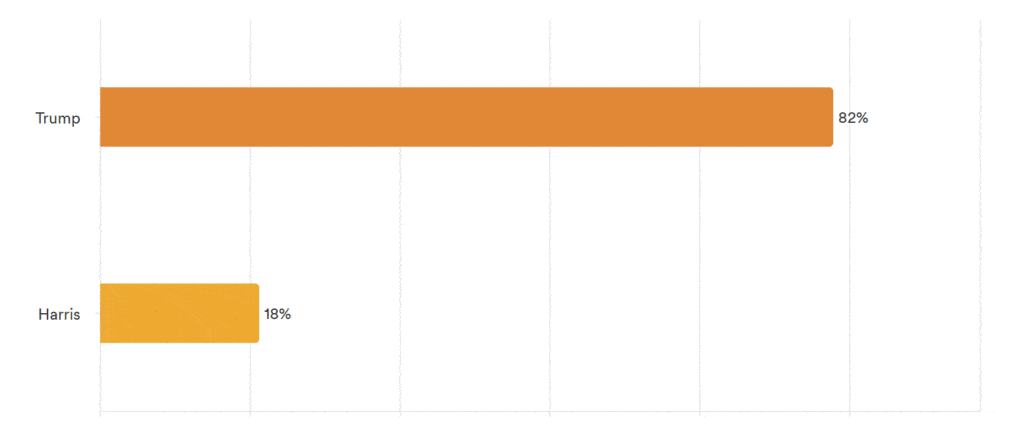Last month, the LANDTHINK Pulse posed the following question to our audience: Which presidential candidate’s policies will have a more positive impact on the land market?
As the race tightens between Vice President Kamala Harris and former President Donald Trump, speculation is rife about how the economy and specific markets will be influenced by the outcome. Our informal online survey unveiled that 82% of respondents believe that Trump’s policies would be better for the land market. There was no close second. Only 18% of respondents thought Harris would have a positive impact on the land market.

Land investors and real estate professionals are keenly focused on how the election outcome might affect key tax deferral strategies, particularly qualified opportunity zones (QOZs) and 1031 exchanges. A Harris or Trump presidency could shape these important investment vehicles based on their past actions, statements and policy positions and with the assumption that their future plans will be in line with their past positions. Keep in mind that either candidate might have their ambitions curtailed by a Senate or House that may or may not offer much support for their agenda.
Vice President Kamala Harris and former President Trump have radically different visions of America, and Americans have a lot riding on the outcome. The most direct impact that presidents have on the land brokerage industry is through their tax policies. These policies can make or break land investments. As the race tightens, some voters have their eyes set on how the two candidates would impact the land market.
Conservation Easements
A conservation easement is a legal agreement, in which a property owner donates development rights on a piece of land to a public agency or qualified charity, usually a land conservancy. The donor retains ownership of the land but contributes its development value in perpetuity, that is, what the property could be at its highest and best use. Conservation easements incentivize property owners to conserve land and historic sites by offering a charitable deduction. The purpose of the conservation easement can be to protect wildlife, plants or ecosystem, preserve historical structures, preserve areas for recreation or education, or to preserve open space.
Trump Policy
The vast bulk of his charitable tax deductions came from simply agreeing not to develop land. Trump has placed conservation easements on several of his properties. One on the Trump National Golf Club Los Angeles, prohibiting the construction of houses. In 1995, he donated a conservation easement on Mar-a-Lago to the National Trust for Historic Preservation that protects special features of the historic building and property, and later expanded the easement to limit home development. In 2005, Trump took a $39 million deduction for an easement on his private golf course in Bedminster, New Jersey. In 2015, Trump signed a conservation easement with a land conservancy, agreeing to avoid development on his Seven Springs estate in Westchester County, New York. Like other land owners in the United States, Trump avails himself of the benefit of conservation easements. The Internal Revenue Service (IRS) is once again increasing scrutiny of conservation easement transactions. The IRS has recently issued regulations that identify certain syndicated conservation easements and similar transactions as “listed transactions.” In doing so, the IRS has declared such transactions as tax avoidance transactions for which the IRS may impose substantial penalties on taxpayers and certain tax advisors, including for the failure to specifically disclose those transactions in their tax filings. This, of course, is in addition to denying the deduction for the charitable contribution altogether. While many charitable conservation easements that are not abusive will fall outside the scope of the new regulations, the requirements for legitimate charitable conservation easements are highly complex and need to be structured with the assistance of a tax advisor familiar with the rules.
Harris Policy
Harris’s stand on Conservation Easements is one area that has not been verified. After scouring articles on the internet, her position on this tax deduction is hard to determine. The deduction for conservation easements has enjoyed broad bipartisan support. The 2023 omnibus spending bill, signed into law by President Biden, was a massive $1.7 billion spending spree that limited tax write-offs for land donations for investors. The provision, urged by a bipartisan coalition of lawmakers, limited deductions for conservation easements. Under the new rule, syndicated easements appraised at more than 2.5 times the land’s purchase price will be deemed ineligible. This creates a clear rule that attempts to dampen incentives for abuse without eliminating good easement deductions.
Estate Taxes
Estate tax is a tax on the transfer of property after death. It is such a minor tax, yet it has continued to be a major partisan battleground. Democrats dislike estate taxes; they favor taxing wealthy people more at a time of surging wealth inequality. Republicans say it amounts to double taxation that places an unfair burden on family-owned businesses, like ranches and farms. The federal estate tax generally applies when a person’s assets at the time of death exceed $13.61 million ($27.22 million for couples) in 2024, minus any applicable gifts.
Trump Policy
In the 2016 campaign, Trump was specific about his plan to repeal the federal estate tax. Republicans haven’t succeeded in an outright repeal of what they call the “death tax”, but the tax overhaul that President Donald Trump signed into law in December 2017 doubled the amount of wealth that escapes the 40 percent estate tax. As landowners, ranchers and farmers recognize the value of the president’s tax cuts. Trump championed the efforts and outlook of farmers and ranchers, recognizing that there are no better stewards of the land than those who depend on it for their livelihood.
Under the Trump tax plan, the exemption amounts were raised significantly, reaching an all-time high of $13.61 million per individual in 2024, indexed for inflation. These generous exemptions effectively shielded the vast majority of estates from federal wealth transfer taxation. However, since these tax laws were created when Trump was president pursuant to the Tax Cuts and Jobs Act, which sunsets on Jan. 1, 2026, legislation would be needed in order to make these tax laws permanent.
Harris Policy
Harris plans to dramatically increase estate taxes. Vice President Kamala Harris announced her endorsement of the estate tax provisions contained in the American Housing and Economic Mobility Act of 2024 (the “Act”). Many of these provisions are changes that President Biden wanted to make in 2020 but was not successful. Note that the Harris provisions are independent and will supersede the estate tax provisions scheduled to “sunset” in 2026. For example, the estate and gift tax exemption are set to be reduced to about $6,000,000 on January 1, 2026. Under Harris’ proposal, it would be reduced to $3,500,000 upon proposal of the Act.
1031 Exchange
If you own investment property and are thinking about selling it and buying another property, you should know about the 1031 tax-deferred exchange. Named for the IRS tax code to which it pertains, it allows an investor to sell a property, to reinvest the proceeds in a new property, and to defer all capital gain taxes. The 1031 Exchange is vital to brokers and agents (more deals), banks and mortgage lenders (more borrowers), and property owners (increased demand). It helps farmers, ranchers and other rural landowners put the return on their investment to work when exchanging one property for another. Until recently, the exemption applied to an array of assets, such as industrial equipment and rental cars.
Trump Policy
As a former real estate developer, Trump has long been familiar with 1031 exchanges and has historically been supportive of the provision. During his first term, his administration successfully defended 1031 exchanges from elimination during tax reform negotiations.
If re-elected, Trump would likely:
- Maintain the current 1031 exchange rules without significant changes
- Explore ways to expand the use of 1031 exchanges, such as allowing them for a broader range of asset classes (although the TCJA actually eliminated multiple assets from eligibility for 1031 exchanges in 2017)
- Push back on any efforts to limit or eliminate the provision
Harris Policy
Harris has been less vocal about her position on 1031 exchanges, but her broader tax policy positions provide clues to her potential approach. As part of President Biden’s campaign, she supported plans to eliminate 1031 exchanges for investors with annual incomes over $400,000.
While not mentioning 1031 exchanges directly, she has indicated an interest in closing tax loopholes that she and other Democrats say primarily benefit the rich and large corporations. There has been growing discussion among Democrats about curtailing or eliminating this program for investors. This may disincentivize property turnover, leading to fewer real estate transactions and slower market movement.
The contrast between Harris and Trump on tax issues that primarily affect the land market is stark.
Harris would likely seek to tighten regulations and close what she sees as tax loopholes benefiting primarily wealthy investors. Her approach would probably involve more government oversight, stricter qualification criteria and potential limitations based on income or investment size. Kamala’s policies could place more financial burdens on property owners through higher taxes and stricter regulations.
Trump’s approach would probably involve less government intervention and broader eligibility. Donald Trump is on record for saying he wants to simplify the tax code and encourage investment. If your goal is to maximize your land investments, Trump’s approach aligns more closely with that vision. In an interview with Anthony Licata for Field and Stream and Outdoor Life in January 2016, Donald Trump shared a sentiment all of us would agree with, “We have to be great stewards of this land. This is magnificent land. And we have to be great stewards of this land.”
Do you have a suggestion for next month’s Pulse question? Submit your question and we might choose yours!
This content may not be used or reproduced in any manner whatsoever, in part or in whole, without written permission of LANDTHINK. Use of this content without permission is a violation of federal copyright law. The articles, posts, comments, opinions and information provided by LANDTHINK are for informational and research purposes only and DOES NOT substitute or coincide with the advice of an attorney, accountant, real estate broker or any other licensed real estate professional. LANDTHINK strongly advises visitors and readers to seek their own professional guidance and advice related to buying, investing in or selling real estate.










For the past four years, our world has been chaotic and unpredictable. When that happens, people hunker down. When the policies and events around us are reasonably predictable, people feel less risk-averse and return to enjoying life. The land market was better under Trump and will be better again.